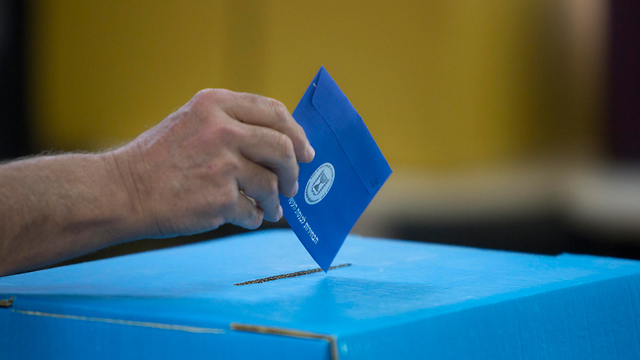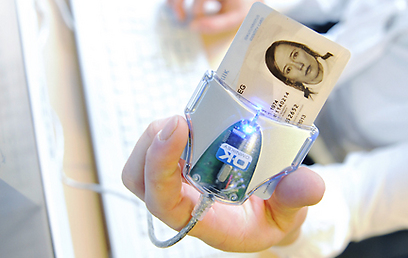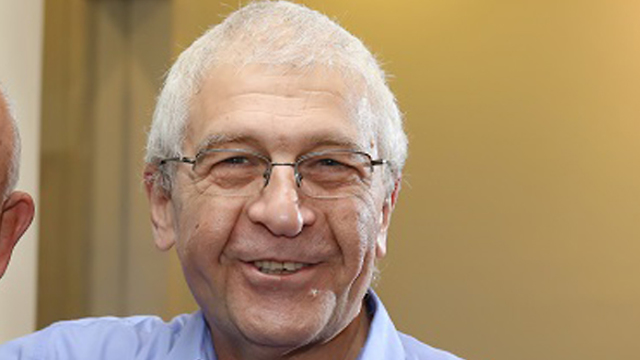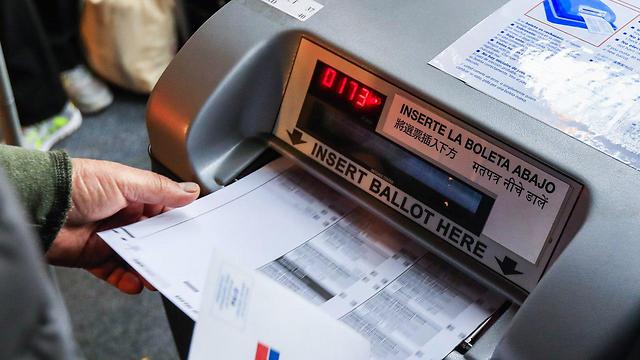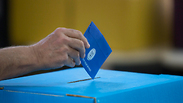

Voting to stay secure: Israel a long way from electronic ballots
After 70 years, Israelis still use paper slips to cast their ballots, for it seems that the start-up nation is well aware of the pitfalls of digital voting, and while some say the time is right to modernize the system, cyber experts warn that going electronic could leave the country open to hacking from a variety of sources, including from within
Tears could be seen on the face of Orly Adas, the director of the Central Elections Committee, two weeks ago, when she began speaking at a meeting to discuss the final election results. The tears were an expression of the enormous tension and frustration felt by members of the committee during the period between Election Day and the release of the results.
"We were under ferocious attack," says Adas, referring to efforts by the New Right party to undermine the validity of election results that put them just 1,500 votes short of the threshold to enter the Knesset.
That said, one must not cast aside claims made on social media by voters unaligned to a particular political party, who cite examples of distortions in the vote count. In the end, the question is whether there a way to improve the voting system and the count, both of which have barely been modified since the establishment of the State of Israel in 1948, despite the enormous technological improvements made in the past decades?
On April 9, Israel held its 21st election held for the country's legislative body. And, like on the 20 occasions before it, voters had to physically go to the polling station to their home and manually choose a ballot paper bearing the name of the party they favored.
When the ballots closed, the votes were manually counted by members of the election committee for each of some 10,000 polling stations. These committee members then registered the results in a protocol and physically passed them to their regional elections committee, which then sent the results to the Central Elections Committee, which then entered them into a computer.
When the apparently final results were published on the Central Elections Committee website, some irregularities emerged. For example, mostly right-wing West Bank settlers appearing to have voted in large numbers for a joint list of Arab parties, and a hitherto unknown religious party receiving most of the votes from a mostly secular moshav. From a recount it appears that these irregularities were a result of human error, which led to votes from one party being transferred to a neighbor on the list of protocols.
These errors were fixed, as were complaints about specific ballot results. A sample of 400 ballots found that there were only a few such discrepancies. But even so, those few errors led to public doubt over the validity of the final results as a whole, which is truly devastating for any democracy. Would a modified voting system prevent such doubts?
Start-Up Nation does everything using its brain
"The lack of confidence will be in the system as a whole," says Dr. Tehilla Shwartz Altshuler, a senior fellow at the Israel Democracy Institute. "There will always be a losing party to claim discrimination and cast doubt on the system. I think that the start-up nation is acting wisely by not transferring to an electronic electoral system. With an electronic system, it is easy to meddle in all sorts of ways – at the polling station, as data is gathered to send to the main computer system and in the main computer system itself."
Computerizing the voting system and the vote counts can be done at different levels, starting with a manual count using an electronic scanner, while saving the ballots in case there is a need for a manual recount, or computerizing the ballot itself without the use of paper, and last but not least, voting online without the need to even visit the polling station.
Estonia is an extreme example of a country whose voting system is entirely electronic. Citizens can cast their vote online in runup to Election Day - and can even change their vote. On Election Day itself, one must go to the polling station to cast a vote. The final vote is the one that is counted.
The most recent parliamentary elections in Estonia were held last month, with 44% of the electorate casting a vote online. While computer experts claim that the system in Estonia is not well organized or protected from cyber attack. On the other hand, state authorities claim that the elections are secure and even reduce the risk of interference.
Dr. Ivo Kubjas, the engineer behind the electronic voting algorithm at Estonian firm Cybernetica, says that the electronic voting was a natural progression.
"When IDs became electronic in 2001, we came up with the idea of voting electronically nationwide," he says.
"In 2004, Cybernetica won the bid to develop a computerized voting system in Estonia," he says. "Since then we have tested the system repeatedly and analyzed the risks. As the electronic system became widespread, it also became vulnerable to cyber attacks - and in fact there were attempts to hack the system. Today, 44.4% of Estonian voters do so electronically and the rest go to the polling station like before.
"There was never any intention for so many to vote electronically, and there is some consideration of whether to limit the rate of electronic voting. The protocols are improving and so is cyber security, but there is no such thing as foolproof."
In Israel no one dares even suggest online voting, but there are companies like ComSign, which specialize in computer security and are in favor of electronic voting.
"An electronic election system is not technologically complicated," says ComSign Director-General Zeev Shetach. "Every registered voter goes through a scrutinized identification process and then simply presses a button that represents the party they are voting for. Fear is a terrible guide, and those who spread fear on a daily basis about how terrible an electronic system would be are the worst kind of people. With this kind of fear, we would not have advanced in any field."
Shetach also seeks to allay fears of voter fraud or cyber attacks that are often associated with electronic voting.
"The digital ballot system is not connected to the internet or any other external network," he says. "When the polls close, the computer quickly counts the votes. Computers today can do every mathematical and statistical calculation in a swift, time-saving manner that alleviates the pressure on candidates, the media and the public.
"We now have a lot of time to test a new system unless elections are held before the legally determined date. Therefore, we can develop a system that we can be proud of and we can present to the world."
Prof. Orr Dunkelman of the Computer Science Department at Haifa University thinks differently.
"As a country we are surrounded by enemies that have excellent cyber capabilities," he says. "Say for example Russia or Iran, countries that have an interest in such affairs, wants to alter the election results in Israel to suit their own agenda. All they would have to do is to hack into some software company, and that is how we would allow other countries to determine our election results."
Dunkelman believes that the current election system is the best system possible.
"Even with the flaws of the recent elections, the system still works," he says. "How much can typing errors affect results on a global level? Most mistakes are relatively minor, and the major ones were fixed."
Although many cyber experts oppose shifting to an electronic system, that does not mean the current system cannot be modified.
One possibility is that is the members of the election committees type the results from their polling station into the computer themselves, and by doing so limit any errors before the final results reach the system of the central elections committee.
This proposal finds favor with Prof. Eli Biham, the head of the Cyber Security Research at the Technion - Israel Institute of Technology.
"Given the way election committee members write out the party lists, in a random manner and illegible handwriting, it's clear why those typing the results make mistakes," he says. "This is not a modern method as one would expect, but rather an outdated method that needs modernization. There is no reason not to computerize the results and we need to rethink the whole computerized election method - save for the actual voting itself."
But Biham also warns against moving to an electronic voting system due to the cyber threat it poses.
"We should not do that," he says. "It is easy to hack a voting machine and change the election results. The problem with electronic voting is that you cannot detect hacking. The machines store the numbers and we have no other choice but to believe the results."
Biham also brings up the possibility that governments themselves could seek to alter election results.
"Think of the people who would be preparing this electronic voting system for the government," he says. "Those people could fix the results as they pleased. We would have no way of knowing. This would not be a cyber attack, but rather results fixed in advance. Adnd once we move to such a system, there is no going back."















